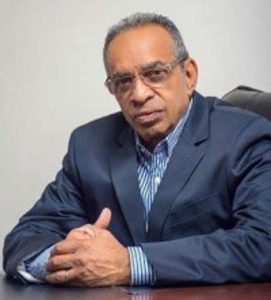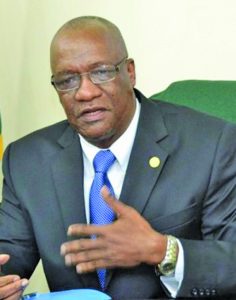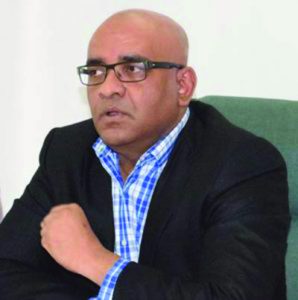…rejects SARA Bill concerns
The barrage of concerns about the violations of constitutional rights and the dangerous implications of the State Asset Recovery Agency (SARA) Bill has been rejected by Minister of State Joseph Harmon, who contended that Government is entitled to do whatever it wants.
“It’s a Government Bill and the Government will determine what happens to its Bill,” Harmon said in response to the latest cries of concerns expressed by the Private Sector Commission (PSC).
The PSC, in a letter to the Speaker of the National Assembly dated February 6, expressed its observation that no meaningful changes have been made to the provisions of the legislation, despite concerns from civil society.
The SARA Bill was tabled in the National Assembly by Attorney General Basil Williams last month and will come up for debate on March 9.
Harmon argued that unless the Government feels inclined to take the SARA Bill to a Parliamentary select committee after the debates, its Parliamentarians will vote in favour of its passage.
However, he assured that Government consists of “consensus people”, and therefore, if at the end of the debate its members “recognise that there are issues in the Bill”, then that will be a “motivator” to entertain more consultations.



“When the matter goes to select committee, it is really giving the public and several organisations another opportunity to comment on it and we have already given them that opportunity,” he explained.
Concerns
The PSC, in its letter to the Speaker, maintained that the provisions of the Bill are in conflict with the rights enshrined in the Constitution of Guyana and constitute a threat to democracy and good governance.
The PSC had previously expressed that the SARA Bill is not only dangerous and disingenuous in its current construct, but it has been found to be in violation of numerous sections of Guyana’s supreme law – the Constitution.
During the consultation phase of the draft legislation, many stakeholders objected to the Bill in its current form, particularly to the fact that the entity’s Director would be vested with “virtually unlimited authority, making him the most powerful man in the country, second to the President.”
Former Attorney General and Member of Parliament (MP), Anil Nandlall had expressed concerns about this legislation setting the stage for the creation of a parallel justice system.
He noted too that the Bill would create an environment that encourages the violation of individuals’ constitutional rights and undermine the rule of law, since it conferred powers ten times greater than those of the Guyana Police Force on a sole individual – the Director of SARA – who currently is Professor Clive Thomas.
He observed too that the Bill would create a series of new offences, the SARA Director was vested with unparalleled powers to investigate the newly-created offences and persons could be rid of their properties without ever being charged with a crime.
He explained that the Bill redefined the term “unlawful”, diluting the seriousness of a “wrong” which could now warrant the seizure of one’s property.
The Guyana Human Rights Association had also raised concerns over the political imbalance of the Parliamentary Appointments Committee, which would be tasked with selecting the Director of SARA.
Concerns were also voiced by the President of the Guyana Bar Association, Gem Sandford-Johnson over the amount of power instilled in the Director and she recommended that a Board of Directors be installed to govern the agency.
Funding
SARA will be funded utilising monies seized as part of its operations and the proceeds of the sale of properties seized by the unit from persons believed to have acquired State property unlawfully.
According to the proposed legislation, there shall be established the recovery of State assets, for the purposes of receiving credit from civil recovery orders and payments made or debts recovered in relation to civil recovery orders made.
Mapping
One of the first orders of business when SARA gets its legal framework is to launch a number of investigations into the owners of the high-rise buildings across the country, with the aim of clamping down on tax evasion and money laundering.
According to media reports, Dr Thomas wants to ensure that the money used to construct the buildings was clean, the buildings are not being used as a conduit for corrupt activities, the owners are paying their taxes, and the land was lawfully obtained.
Opposition Leader Dr Bharrat Jagdeo had warned that this move would drive away investors. He also questioned the rationale behind targeting only high-rise buildings.











